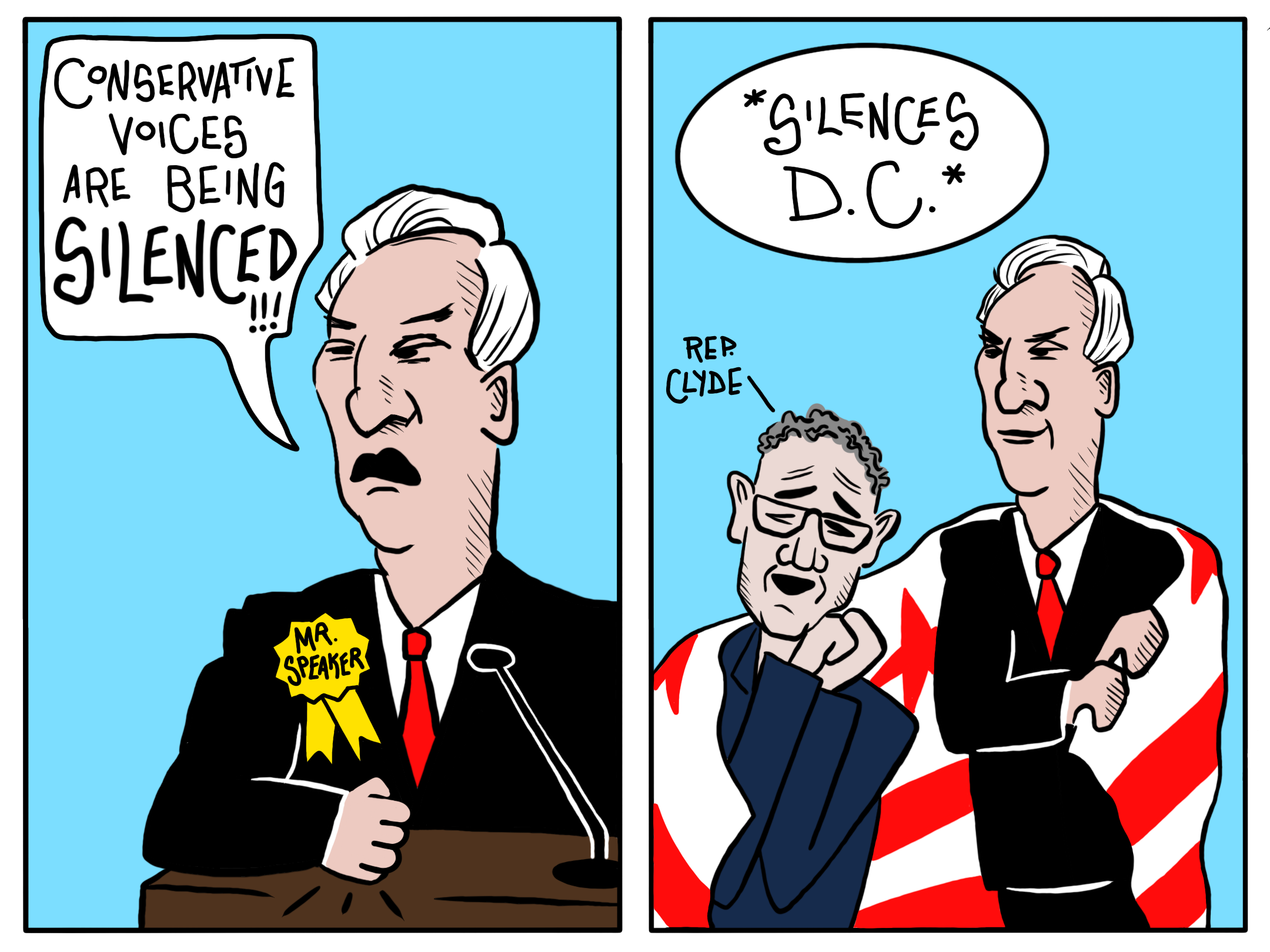Republican interference in the governing of D.C., an overwhelmingly Democratic, majority-minority city, is neither new nor unexpected. From attempts to prevent the reduction of law enforcement funding to the prohibition of publicly funded abortion procedures, Republicans have often sought to impose conservative policies on our unwilling city. While these attempts have long concerned D.C. residents, Republicans’ ability to enact changes had been hampered by their limited congressional power over the past two years. Current Republican control over the House of Representatives has reduced these limits. Though the effects of a Republican House and the newly empowered, ultra-conservative Freedom Caucus will be felt nationally, the shift is particularly noteworthy for D.C. because of the city’s limited autonomy.
Under the District Clause of the U.S. Constitution, Congress has the power to modify and overturn any D.C. legislation, impose laws on the District, and approve D.C.’s annual budget. Only the 1973 District of Columbia Home Rule Act, which created the office of the D.C. mayor and the D.C. council, affords the city any measure of self-governance. Despite D.C. residents advocating for statehood for decades, Republicans have blocked the change, arguing the left-leaning District would add power to the Democratic contingent in Congress.
Historically, Republicans have engaged in voter suppression against Black communities; D.C. is no different. Statehood for D.C. would also increase the congressional power of Black voters, considering nearly half of the District’s population is Black; it comes as no surprise the party is anti-D.C. statehood.
On its own, a Republican majority in the House is enough to concern advocates for D.C.’s autonomy, but combined with the concessions made during the drawn-out House Speaker race, the new Republican House is particularly alarming for statehood supporters. To gain votes from some of the most extreme Republican representatives, Speaker Kevin McCarthy was forced to concede on several key demands. These included appointments of far-right politicians to key positions—many of these likely to go to members of the House Freedom Caucus, widely considered the farthest-right bloc within the House. Rep. Andrew Clyde, who is pushing to outright repeal the Home Rule Act, is a member of this caucus.
Perhaps more important than committee assignments is the concession to allow unlimited amendments to government funding bills. In the past, much Republican congressional meddling in D.C. policy has come in the form of riders on budget bills—amendments to the federal budget that dictate what the federal government can and cannot fund. One such example is the 2016 prohibition on publicly funded abortion procedures and the commercialization of marijuana. Riders are often controversial and can be snuck into thousand-page spending bills with little or no public debate, sometimes even without lawmakers’ knowledge. More amendment power for far-right Republicans in the House is likely to mean more extreme interference in D.C. politics against the expressed desires of District residents.
House Republicans have already shown eagerness to use this power. During the speakership election, Republicans vowed to block a recently passed bill that permits noncitizen residents of the District—including undocumented immigrants, green card holders, and temporary residents on visas—to vote in local elections starting in 2024. This legislation is currently under congressional review. In order for Congress to fully block the bill, it must pass a disapproval resolution in both chambers, which is unlikely to succeed given the Democratic majority in the Senate. House Republicans, however, could use budget riders to disrupt or limit the legislation’s impact. They have also vowed to stop D.C.’s criminal code overhaul, which proposes an end to most mandatory minimum sentences, jury trials in almost all misdemeanor cases, and a reduction in the maximum penalties for burglaries, carjackings, and robberies.
The Editorial Board has long made radical calls for change in this city, including its environmental, housing, and policing policies, but congressional interference makes even D.C.’s current plans for reform unlikely to succeed. The new House could also take aim at Mayor Bowser’s recently announced downtown revitalization plan, which aims to create new jobs, fill key gaps in food, housing, and internet access, and raise the median household income of Black residents by $25,000. Congressional disruption of this plan would endanger the immediate needs of residents, which are pressing. A quarter of D.C. households still don’t have broadband internet connections, with a majority being Black households in wards 5, 7, and 8. The mayor’s plan would see substantial improvement for these residents, but not if the House blocks it or amends it beyond recognition.
Even if congressional policymakers are engaging in debate over the mayor’s revitalization plan, for example, the problem remains that members of Congress who were not elected by the residents of D.C. are aiming to stop the actions of D.C.’s democratically elected, local officials.
Republican policy-meddling is also disproportionately harmful to Black residents. The subsidization of abortion from D.C.’s own local funds, for example, would have benefited Black communities, as three-quarters of those who die in or of complications from childbirth are Black women—and the District has the highest maternal mortality rate in the nation.
Republicans are not even interested in talking to the District’s leaders, going so far as to ban Mayor Bowser from the House floor, despite maintaining the privilege for governors, foreign ministers, and 15 more categories of people. Withdrawing the mayor’s floor privileges is nothing short of petty, and speaks to the immaturity of the new Republican majority. Moreover, the incident epitomizes the Republican’s perception of the District as a city to be governed, not listened to. The District deserves autonomy from the personal political wishlists of an overwhelmingly and disproportionately white, male Congress with little real understanding of the lives of many District residents.
The Editorial Board believes that statehood for D.C. is essential for its over 700,000 residents who are openly denied equal citizenship. D.C. has no voting member in Congress, and despite contributing more per capita in federal income tax than any area in the country, its people have no say in how their money is spent. The Republican House is further perpetuating this harm by threatening the limited agency the District has enjoyed under the past two years of a Democratically controlled Congress.
The people of Washington, D.C. deserve the same rights afforded to residents of states. The District’s future must be of the making of its residents, and not of a House full of far-right Republicans eager to prolong the white paternalist ideology that has long denied D.C. the freedom and representation it deserves. The Editorial Board calls on the House of Representatives to refrain from imposing its unwanted political agenda on the people of D.C. and to respect the will and autonomy of D.C. residents and their elected representatives.




